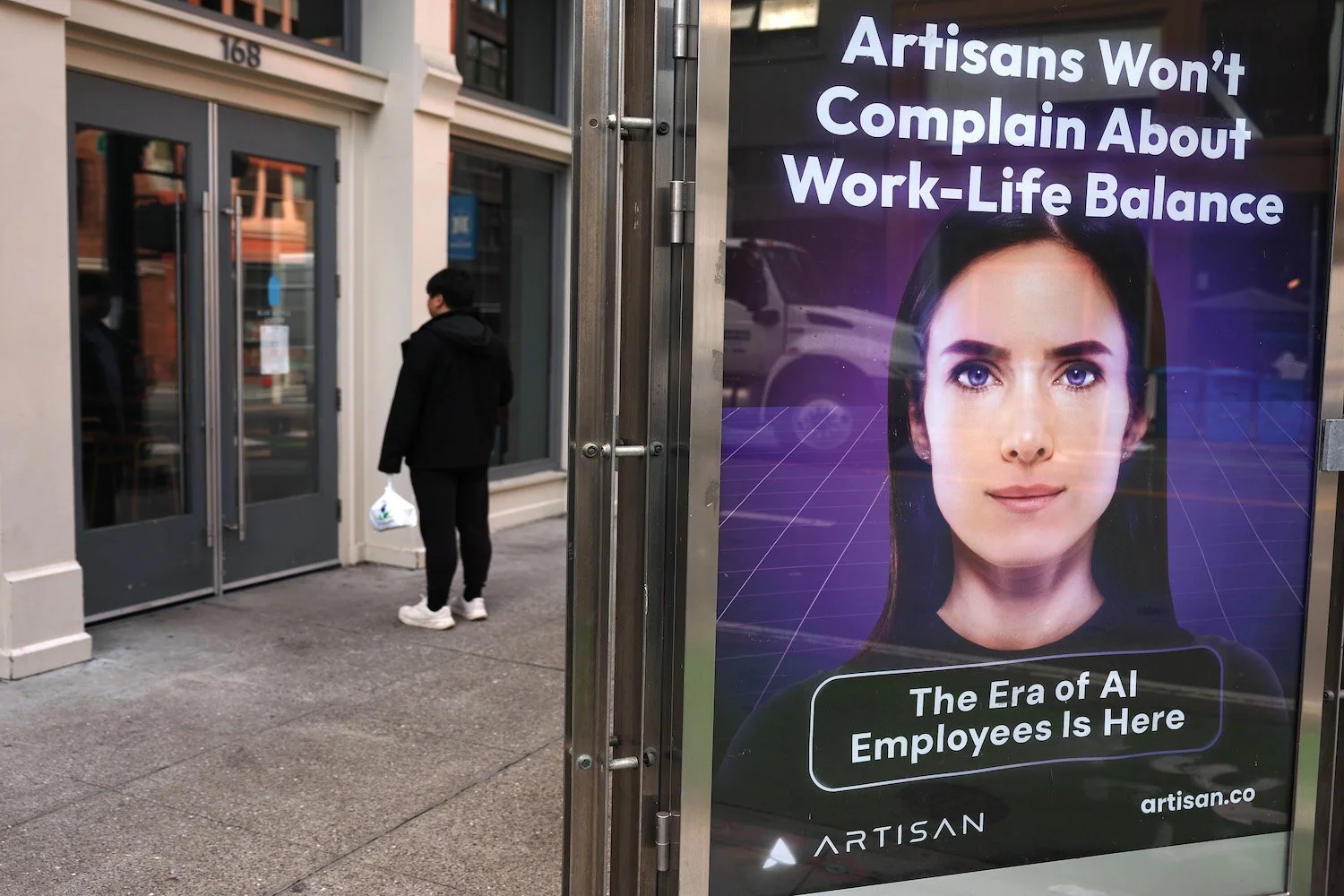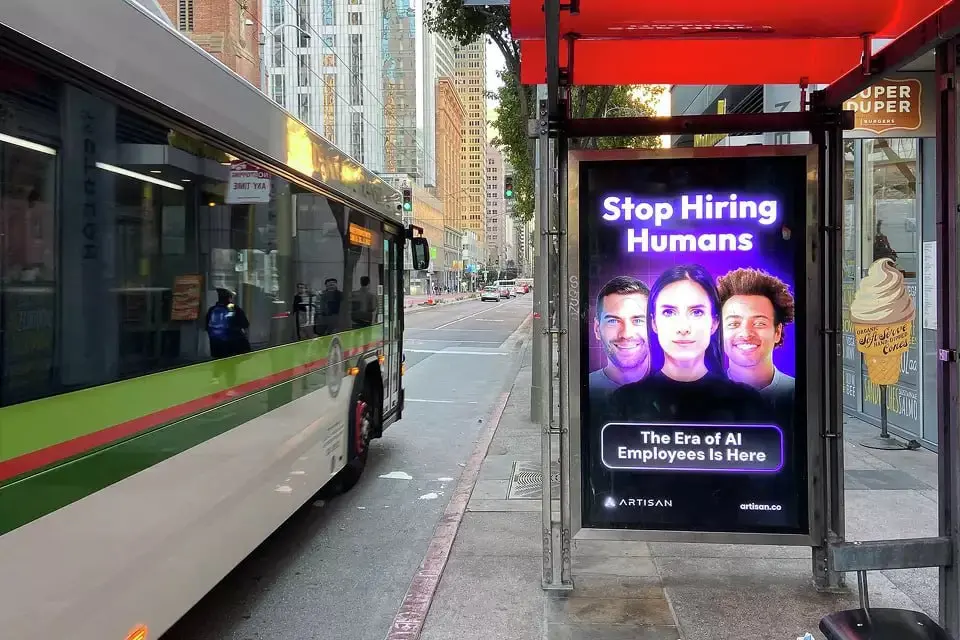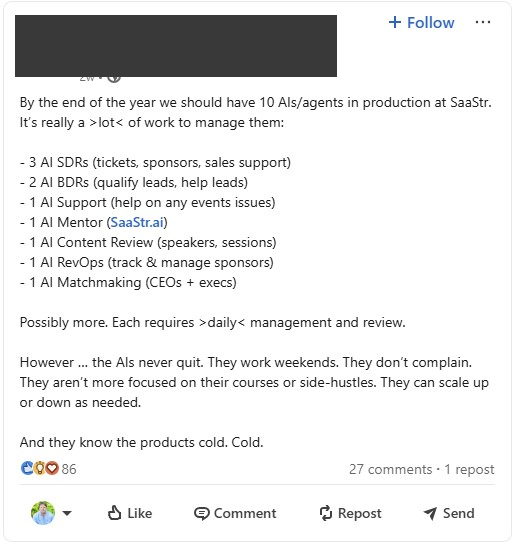The AIvolution of humankind
- Jamie Clark

- Sep 3, 2025
- 5 min read
Updated: Nov 1, 2025
1. Going 'forward'
Not long ago, “Artificial Intelligence” felt like a phrase from science fiction, best left to neon-lit films and the imaginations of futurists. Like, I, Robot. Iconic.
Now, it's everywhere - and also, paradoxically, nowhere. AI now hums quietly behind the photos we post, the emails we send, and the ads that seem to know us a little too well. Like FreeNow. Anybody else in Spain got this ad? Wowza, their marketing spend must be through the roof.
AI is threaded into the fabric of our days so smoothly that, in many cases, we’ve stopped noticing when we’re using it. Businesses, who once met the phenomena with scepticism now add AI into their operations without a moments hesitation. Venture capital funding has poured into the space at unprecedented levels, chasing the glittering promises of efficiency, disruption, and big multiples.
Data:
Venture capital investment in AI has shown significant growth, with over $104 billion raised by AI startups in the first half of 2025, and AI companies receiving over 50% of all global VC funding during the first half of 2025. In the U.S. specifically, AI investment accounted for 71% of venture funding in the first quarter of 2025, a substantial increase from the prior year. Key deals included a significant $40 billion round for OpenAI, contributing to the record funding levels seen in the sector. We clap, we celebrate, and in the business world, we point to adoption curves as if they were proof that faster is always better.
But behind the extraordinary growth numbers in new AI businesses lies something else - an unease that doesn’t quite go away. Because beneath the thrill of acceleration is the question we rarely stop to ask: how fast is too fast?
Addicted to velocity, we want every task reduced to seconds. We want stuff yesterday. And now, the question now isn't whether something can be automated, but rather why it hasn’t been already, and we are told this for a greater 'cause' that 'humans can enjoy more time to be creative, strategise, focus on the work that matters bla bla bla' .
The question is: what's our end game?
Data:

Safe to say OpenAI are doing pretty well.
And other companies and industry thought-leaders are betting big on AI agents to do our work for us. Some clips:
2. We all sound the same
In a seperate article I published in August 2024, I wrote about ChatGPT unifying our voices, particularly online. And this has only become increasingly true.
Spend an hour in your inbox and you’ll see it. Messages that feel perfectly polished but hollow. Sentences that are tidy, tone too balanced, empathy pre-packaged. Then, scroll through LinkedIn or Instagram and you’ll notice the same trends.
All digital content is beginning to sound eerily alike: different faces, different names, but one unified voice. An algorithm. Those spelling mistakes that remind others we're human - have now been edited out of existense.
I'm kidding, existence.
And what remains? A chorus of uniform, risk-free voices. Perfectly competent, but all equally unremarkable.
This article by Vice outlines that the use of ChatGPT is now not solely impacting how we express ourselves in the digital sphere, but also how we communicate verbally. Wow.
Other data points for ChatGPT usage rates:
From August 2025
Weekly active users: Generally estimated between 700 million and 800 million, possibly approaching 1 billion.
Daily active users: Around 190 million.
Prompts per day: Around 2.5 billion.
Monthly visits: Approximately 5 to 6 billion.
Global reach: Roughly 10% of the global population uses ChatGPT.3. Loneliness in the Crowd
Technology and social media promised connection, and in some ways, it delivered.
We can now speak instantly with someone across the world, which, being Australian who spends a lot of time in Spain, helps immensely. I love sharing ideas, images, videos in the spur of the moment. And yet, the data (and the eye test) would suggest that loneliness is only deepening.
Among young adults - those most immersed in digital worlds - feelings of isolation are climbing. They carry thousands of 'friends' in their pockets, yet many describe feeling unseen.
Because when so much of our communication flows through filters and algorithms, is it any wonder that it no longer feels meaningful?

I've stumbled across some companies looking to address this. Balance Phone, founded by two Catalan entrepreneurs, shows some promise in this realm.
Another startup is called TimeLeft, where they organise weekly dinners, hosted on Wednesdays, aimed to bring together six strangers to have dinner together.
These exists, because we know there is an existential problem to address.

'Where to meet people' is skyrocketing in search queries.
4. Regulation isn't always a bad thing
History is full of examples of when society has had to step in.
For example, tobacco, when its toll on health became undeniable. Alcohol, when its effects demanded recognition. In each case, governments intervened - not to eliminate, but to balance. To protect us.
They identified something that could be harmful to our social cohesion, and then took action - not to eliminate it entirely, but to limit and moderate its consumption through changes in packaging, pricing, laws, and other measures. Of course, there are those who believe the government should stay out of such matters and just let people fend for themselves. I don’t share that view. In this example, I think life is better when people are obliged to control their alcohol consumption.
And with AI, at this stage, the trend is less clear. Because innovation is celebrated, regulation is taboo. We reassure ourselves with the language of “free markets” and “progress,” as if these absolve us from asking harder questions about wellbeing. And for the most part, for those that know me, I very much advocate for free-market economics, but not at the cost of hollowing out the very resource all of it depends on: our minds.
So, what about our cognitive health? Our ability to focus? Our capacity to discern between authentic and manufactured human signals? These are not as easy to measure, but they matter deeply. A society’s infrastructure is founded by the minds of its people. If those become fragmented, numbed, or over-optimised into sameness, the cost will be profound.

I don't believe it's left field to put a regulation on dating apps, mostly used by young people, to use AI to send messages to people.

Beers are looking pretty harmless now. Benchmarked against this.
5: Why the Sun Will Come Out
If you are this far in the article, you may read this is a pessimistic take. Some parts, yeah, that's for sure. However, I continue believing that human beings have an extraordinary ability to recalibrate. History is a pendulum: we swing too far in one direction, and slowly, inevitably, we are pulled back.
And there are plenty of signs of this counter-tide. The rise of 'digital detox' retreats. Live events are booming. The renewed interest in crafts, in gardening, in board games, in anything that feels tangible. My niece who is 18 years old has a Nokia!
I think people are beginning to seek friction again - the awkwardness, the surprise, the small imperfections that remind us we are alive together. The very parts of life that algorithms shouldn't even try to replicate. We just don't need it to.
Undeniably, AI is only accelerating from here, but the sun is coming out, and the sense of feeling connected to the world is unbeatable.











